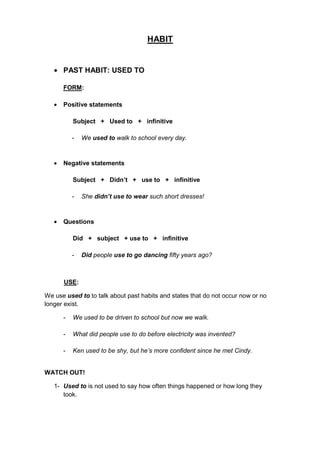
Habit
- 1. HABIT • PAST HABIT: USED TO FORM: • Positive statements Subject + Used to + infinitive - We used to walk to school every day. • Negative statements Subject + Didn’t + use to + infinitive - She didn’t use to wear such short dresses! • Questions Did + subject + use to + infinitive - Did people use to go dancing fifty years ago? USE: We use used to to talk about past habits and states that do not occur now or no longer exist. - We used to be driven to school but now we walk. - What did people use to do before electricity was invented? - Ken used to be shy, but he’s more confident since he met Cindy. WATCH OUT! 1- Used to is not used to say how often things happened or how long they took.
- 2. 2- Be careful not to confuse used to with be/get used to + noun/gerund. This means be/become accustomed to something because you’ve been doing it for a while. - I’m used to making my own meals. - I can’t get used to the cold winters. • PAST HABIT: WOULD Would is also used to talk about habits and repeated actions but not about pat states. - When I was little, I would/used to play with my brother’s model cars. NOT: We would used to live in a small village • PAST HABIT: PAST SIMPLE This can also be used to describe past habits and states. - When I was a child, I walked to school every day. • PRESENT HABIT: PRESENT SIMPLE OR CONTINUOUS To talk about present habits we can use: - Present simple, often with a frequency adverb: I generally park outside the library. - Present Continuous + always: He´s always going abroad on conferences. This often suggests an annoying habit. My sister is always borrowing my clothes.
